This post contains “people pleaser test” to help you identify people pleasing issues along with 21 proven strategies to stop people pleasing.
- What Is A People Pleaser?
- People Pleaser Test
- Isn’t Pleasing People a Good Thing?
- People-Pleasing Myths: 5 Lies People Pleasers Believe
- The Problem With Pleasing People
- Top 21 Proven Ways to Stop People Pleasing
- Overcome People Pleasing Worksheets
- Conclusion: Accepting That You Can’t Please Everyone Makes You Stronger Mentally
What Is A People Pleaser?
A people pleaser is someone who tries so hard to make other people happy.
They would go out of their way to please someone, often giving away their own valuable time or resources.
This can lead to burnout and feelings of resentment.
Striving to please other people is a form of trying to control how they feel about you. It stems from feeling insecure and having low self-esteem.
People Pleaser Test
Results
#1. Do you have a low opinion of yourself and need others to like you to feel better about yourself?
#2. Do you tend to feel responsible for how other people feel about you?
#3. Does the thought that someone might be mad at you make you feel uncomfortable?
#4. Are you more inclined to agree with people than expressing a contrary point of view?
#5. Do you often find yourself apologizing even when you don’t think you did anything wrong?
#6. Do you avoid telling people when you feel hurt or offended by something they did or said?
#7. Do you tend to change your behavior based on what you think other people expect from you?
#8. Do you struggle to say NO when people ask you for favors, even if you don’t want to do something or don’t have the time and energy to do it?
#9. Do you find yourself often feeling overburdened and resentful?
We will not sell your information. All results are kept confidential.
Results
The higher the score the more problematic people-pleasing is for you.
Your attempts to be a nice person can backfire and get in the way of achieving your goals and dreams.

Isn’t Pleasing People a Good Thing?
Most of us received the message that we should care about other people’s feelings and help them in times of need.
While there is nothing wrong with that, when our self-worth becomes dependent on making people happy, we may end up compromising our own needs and values.
Related: Healing From A Codependent Relationship: 18 Ways to Conquer Codependency
People-Pleasing Myths: 5 Lies People Pleasers Believe
Myth #1: I am responsible for—and have control over—what other people feel and do.
When we believe this lie, we think that we won’t belong or fit in unless we make others happy. We live in a constant state of hypervigilance trying to avoid the fear of rejection and disapproval by figuring out what other people want, and what will make them happy.
We believe that once we give others what they want, they’ll become happy and come to love us and, as a result, we will become happy, too.
We end up ignoring ourselves – what we want, and what will make us happy. Over time, we lose our sense of who we are.
But we don’t just feel responsible for other people’s happiness, we also take responsibility for their unhappiness. If someone gets upset, we assume it is because we did or said something wrong. We assume we’ve failed and we feel ashamed and unlovable.
How did we come to believe this lie?
From a very young age, children are taught that their biggest job is to make parents and other adults feel happy and proud. Their second biggest job is to prevent them from getting upset or angry.
For example, a mother might say to her child, “You’ve made me angry at you.” In this sense, she makes the way she feels about his actions the problem. The child, instead of learning that he is responsible for his actions, learns that he is responsible for his mother’s feelings.
Although most parents are trying to teach their children to be sensitive to the feelings and needs of others, these children are not taught to be sensitive to their own feelings and needs.
Myth #2: Other people are responsible for—and have control over—the way I feel and behave.
This lie goes hand in hand with the first lie.
Because we believe that we are responsible for the way other people feel and behave, we also believe that the way we feel and behave is their responsibility.
We hold others responsible for our own happiness and blame them for not providing it. It’s a vicious circle of blame.
We also do the same when we feel happy: we attribute that feeling to what someone else did.
This reinforces the belief that we need someone else to do something or say something to be happy. In some cases, we may attempt to control or change people, believing that getting them to do what we want is the only way to be happy. This can turn to emotional and sometimes physical abuse.
Many of us would even apply this lie to inanimate objects. We expect that buying a new computer, house, car will make us happy and we feel miserable when we don’t get what we want.
How did we come to believe this lie?
Blame is learned through modeling. When children are routinely blamed for adults’ dissatisfaction, they learn that this is what people do.
As we grow up, we start blaming others for our unhappiness as well.
Myth #3: The needs and wants of other people are more important than my own.
This lie erodes our self-esteem and self-confidence.
As we learn that it’s our responsibility to figure out other people’s needs and what makes them happy, we come to believe that other people, including their needs and desires, matter far more than we do.
Myth #4: Following the rules is more important than meeting my needs and honoring my feelings.
Rules help remove chaos from our lives and provide us with a sense of certainty and safety.
However, when rules discount human needs, they stop serving us and may even wound us.
This happens when we don’t challenge the rules we learned as children and simply accept and live by all of them, without considering if they’re helping us or actually harming us.
For instance, we may obey those in authority – a parent, a spiritual leader, a boss – even when we know they’re abusing their authority.
But we don’t just follow the rules, we would also demand that others follow them, too.
Myth #5: I am not lovable as I am; I can only become lovable through what I do and say.
Most people pleasers learned from a young age that they’re not inherently lovable just by being themselves.
Only when they do what adults want them to and please them, that they are valued and loved.
Each time we’re valued for what we do or who we pretend to be rather than for who we are, the belief that we’re not lovable as we are is reinforced.
At the same time, we learn to blame ourselves whenever we feel rejected, thinking that we must not be sufficiently smart, obedient, or helpful for others to reject us.
It’s because of this limiting belief that we learn to hide our true selves and create a public persona that we think people will like.
Our relationships then become inauthentic and less than satisfying.
Many parents believe that teaching their children these lies helps them learn to be kind and thoughtful. However, they end up making the child less functional and more wounded.
Related: How To Set Boundaries With Narcissistic Parents?
The Problem With Pleasing People
Striving to please others presents several issues including the following:
1. It damages relationships
When you’re constantly doing things for other people to please them, and you don’t feel like they’re appreciating what you’re doing for them, or you feel like they’re not giving you back as much, you’ll soon grow resentful toward them.
You start feeling like a martyr, and you become angry and bitter.
At the same time, others you’re trying to please might start taking advantage of you without forming a deep relationship based on honesty and mutual respect.
Related: Why Nice Guys Suck? Best 19 Practical Strategies To Stop Being The Nice Guy
2. You lose sight of your values
One of the biggest regrets of people on their deathbeds is not being true to themselves.
Instead of dressing, behaving, and speaking in a way that was pleasing to others, they wish they had lived a more authentic life.
People-pleasing holds you back from reaching your full potential.
People Pleasers fear that any success or positive change might not get others’ approval.
Moreover, when you strive to please others, you stop behaving according to your values and focus on what other people expect from you.
3. Chronic Passivity
People-pleasing can make us live in a passive way.
We let others set our goals and tell us what to do. We fail to honor our own boundaries. We avoid conflict at all costs. We don’t take responsibility for ourselves or our feelings.
But passivity has a payoff. We get to tell ourselves that we are not to blame, that what happened was done to us.
Another reason why we might live passively is that we believe that other people are ultimately responsible for our happiness, we conclude that there is no need to advocate for ourselves.
4. Conflict Avoidance
Conflict avoidance is one common form of passivity.
Growing up we learned that conflict makes us feel hurt and rejected.
But conflict is an unavoidable part of life. When we try to avoid conflict with others, we live in conflict with ourselves. We grow angry and resentful and sometimes we become depressed or we may lash out at others.
Put simply, while conflict may help us avoid immediate discomfort, it usually leads to long-term misery.
Related: 9 Signs You Might Be Emotionally Addicted — and How to Overcome Love Addiction?
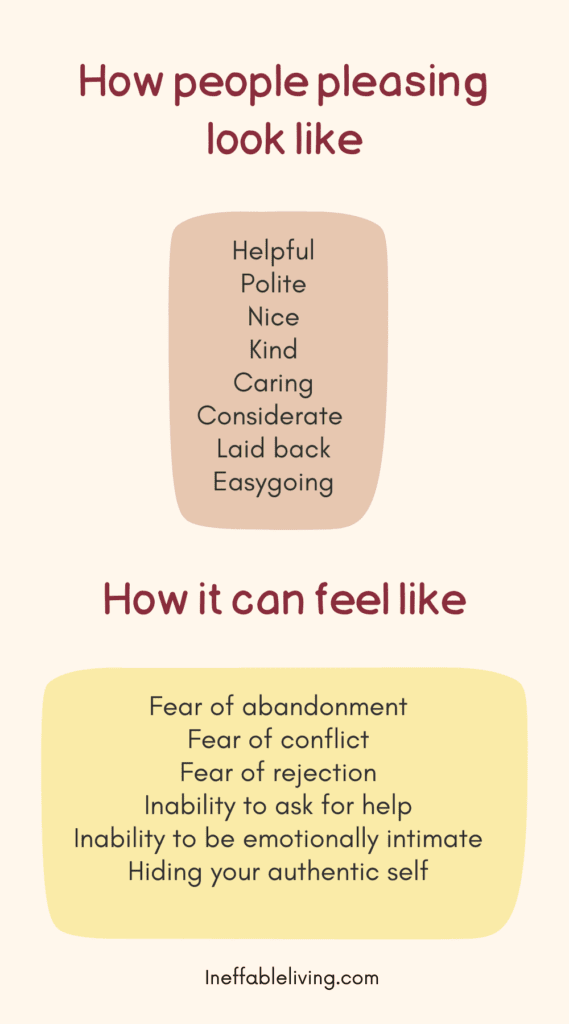
Top 21 Proven Ways to Stop People Pleasing
#1. Become Aware of Your Limiting Beliefs
Write down the 5 lies on a piece of paper and keep it where you can see it regularly.
Review the list every day and try to notice instances where you or someone else reacts out of these lies.
Notice when you or someone else use expressions, such as “You made me late/trip and fall/yell/etc.” or, “You made me angry/upset/ infuriated/etc.” or, “I feel better/happier when you do what I say/want.”
Related: How to Challenge and Change Your Negative Core Beliefs?
#2. Determine Who You Want To Please
If you want to reach your goals in life, you’ll need to choose your own path and not just do what other people want you to do.
Here are some truths that will make you second-guess people-pleasing:
– People-pleasing is a waste of time and energy. You can try to do what you think other people want you to do, but you can’t control whether or not they’re pleased.
And the more time and energy you devote for people-pleasing, the less time and energy you’ll have left for what really matters.
– It’s okay for other people to feel disappointed or angry. Everyone is responsible for his own feelings, and he has the ability to cope with a wide array of feelings.
It’s not your job to make sure others are always happy or prevent them from feeling negative emotions. Just because someone got mad, it doesn’t mean it’s your fault.
– It’s impossible for you to please everyone. People want different things, and it’s impossible for you to always behave in a way that is going to please everyone around you.
Accept that no matter how hard you try, some people will never be pleased.
Read: Best 20 Must-Read Books On Codependency
#3. Change Your Limiting Beliefs
Once you become aware of your limiting beliefs, start replacing them with healthier ones.
Each time you notice yourself reacting out of a limiting belief, stop, mentally replay what you said, and restate it in a way that’s respectful of yourself and the other person.
For example:
Instead of saying, “You made me happy with this gift,” try saying, “I’m very happy with this gift.”
Instead of saying, “I’m late because you keep talking to me,” try saying, “I’m late because I choose to keep talking to you. I have to go now.”
#4. Define Your Values
Is pleasing people one of your top values in life?
Common values include Spiritual beliefs, helping others, romantic relationships, maintaining good friendships, career, money, growth, pleasing people…
Read More: Core Values List: Over 200 Personal Values to Discover What’s Most Important to You
Pick up the top five values in your life and rank them from the most to the least important. Then think about whether or not you’re living according to these values.
Are you devoting much of your time and energy toward something that isn’t on your list?
If so, start making the necessary changes to lead a life that is in line with your values.
#5. Set Healthy Emotional Boundaries
When we people please we begin to lose sight of who we are – our likes, dislikes, wants, needs, feelings, and values.
We focus on taking care of others’ needs because those are supposedly more important than our own.
When we do this, we become boundaryless. We live in conflict with ourselves. Outwardly we agree to something we don’t inwardly agree with.
To start setting healthier boundaries, you need to stop and ask yourself what you want and what is important to you.
You can do that by paying attention to your body.
Your body will send you feedback all the time. For example, when someone asks you to do something, your body will tell you if it is right for you to do it. Please pay particular attention to anger and fear.
If necessary, tell the person that you need a moment to think before you give him an answer.
Overcome People Pleasing Worksheets
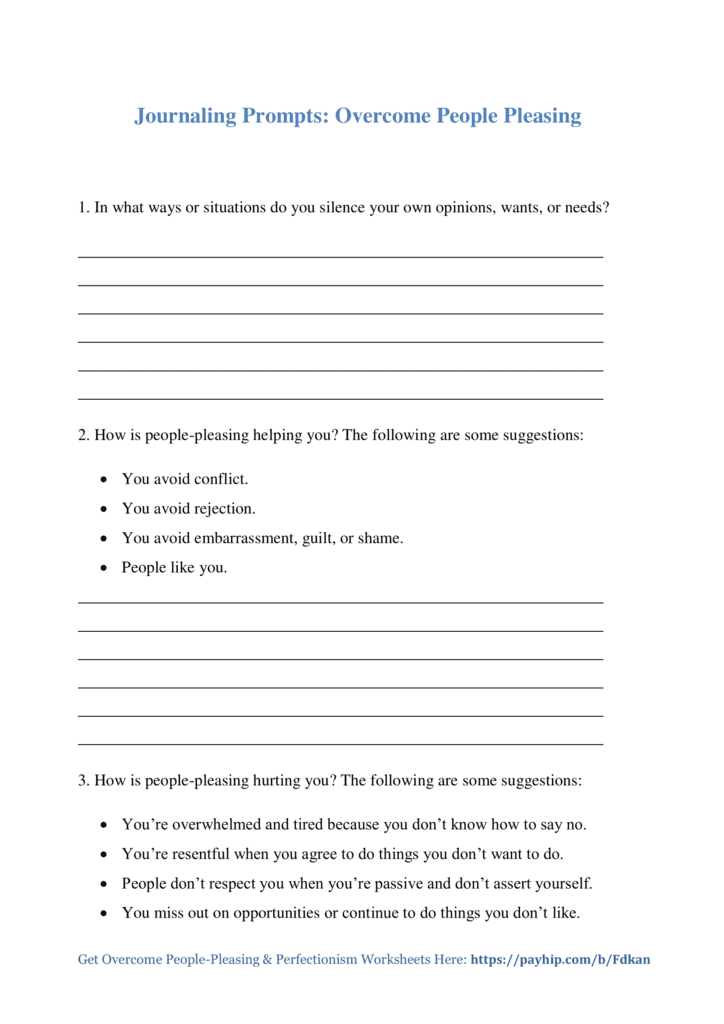
#6. Take Time Before Deciding Whether To Say YES Or NO
If you find yourself automatically saying yes to everything, you need to start taking some time and think about it before you give an answer.
When someone asks you to do something, before saying yes to them, ask yourself these questions:
– Is it something I want to do and what will I gain from doing it? Take a moment to decide whether or not it’s something you want to do.
Whether it was an opportunity for you to grow or to learn something, or is simply an act of kindness you’re willing to do, make sure you never do something against your will.
– What will I have to give up to do this? Doing something for someone will usually cost you something, whether it was your time, energy, or money.
Before saying yes, consider whether or not giving up any of these resources will interfere with other things in your life, like time spent with your family for example.
– How Will I feel if I do it? Will doing it make you feel good about yourself and happy? Or will it leave you angry and resentful? If it’s something you’re doing against your will, it’ll certainly leave you resentful which isn’t healthy for either of you.
If you want to say NO, you don’t need to have an excuse. Saying something like “I wish I could but I’m not going to be able to” should suffice.
It might take some time before you become comfortable enough saying NO, but it’ll get easier with practice.
#7. Learn To Be More Assertive
People pleasers, usually, find it hard to speak up when someone is taking advantage of them or to simply ask for what they need.
You still can ask for what you need and stop someone from taking advantage of you while remaining polite and respectful.
Use “I” statements and only state the facts. People usually feel offended and blamed when you use “You” statements such as “You’re never on time”. Instead, say “I feel frustrated when you’re late”.
It might feel uncomfortable to know that someone is angry at you, but the more you practice, the easier it becomes to tolerate the discomfort and the more assertive you become.
Related: How to Firmly Establish and Enforce Healthy Emotional Boundaries?
#8. Allow Yourself to Make Mistakes
As you practice being your authentic self, you may unwittingly do so in an unkind way at times, before you can learn how to be honest but also kind and compassionate at the same time.
For instance, when someone is giving you unsolicited advice, you may find yourself getting angry and losing it. Instead, take a deep breath, and say something like, “I’ve heard what you want. Thanks for sharing this with me. I really am not looking for advice, I just need someone to listen.”
Allow yourself to make mistakes and apologize when appropriate. Those who really care about you will accept your apology.
Related: How To Make Peace With Your Past Mistakes Today and Never Repeat Them?
#9. Understand Your Emotions
Being a people-pleaser, you may have grown up believing that having emotions or needs can make other people uncomfortable.
Eventually, you lose access to your emotions and find yourself knowing very little about how to take care of them.
Emotions are not the problem. Our emotions hold—a great deal of wisdom. They are feedback about what’s going on inside us and around us. We need to learn to listen to them.
For example, anger could be a sign that you were treated poorly. It pushes you then to set healthy boundaries.
Related: How To Feel Your Feelings & Sit With Painful Emotions? (Top 9 Difficult Emotions)
Try This: Name Your Feelings
When you’re out of touch with your emotions, you may find it difficult at first to name them, beyond sad, happy, and mad.
However, with time and practice your emotional vocabulary will increase and your ability to care for yourself and communicate with others will increase as well.
Throughout the day, pause for a few moments and ask yourself, “What am I feeling right now?” and, “Why am I feeling this way.”
The following is a list of emotions to help you name your feelings:
- Anger; includes annoyance, irritation, and frustration
- Sadness; includes disappointment
- Grief
- Fear; includes nervousness, anxiety, uncertainty, and fright
- Guilt
- Shame; includes embarrassment and the feelings of worthlessness and being “not good enough”
- Happiness; includes joy
- Gratitude
- Hope
- Loving/loved
- Excitement
- Passion
- Stress; includes distress
- Calm; includes peace and acceptance
Related: Are You Extra Sensitive? 9 Steps You Can Take Today To Reclaim Control Over Your Emotions
#10. Acknowledge Your Anger
Most people–pleasers have trouble expressing their anger honestly and respectfully.
Following is a list of angry feelings to help you better identify your feelings:
- Angry
- Annoyed
- Enraged
- Exasperated
- Frustrated
- Furious
- Hateful
- Indignant
- Infuriated
- Irritated
- Mad
- Outraged
- Rageful
- Resentful
- Spiteful
- Vengeful
But it’s not just anger that you need to start allowing yourself to feel. Usually, anger hides or masks other underlying emotions, such as hurt, embarrassment, betrayal, etc.
It’s important to look at other feelings that may be beneath your anger and address them.
Related: How To Manage Your Anger In Healthy, Effective Ways?
#11. Be Aware Your Resentment
People pleasers tend to focus on what other people want, ignore their own needs, and avoid conflict. All of this while believing that other people will give them what they want in return.
But that doesn’t work and over time, people pleasers become angry and resentful.
You need to recognize that your emotions are your body’s language. They’re never the problem. They’re simply feedback about what’s going on inside and around you. You need to become aware of your emotions so you can decide what to do about them.
You may have been told that you’re “too sensitive” or, “too emotional.”
But consider that this says more about the speaker than it does about you. Such statements translate to, I’m uncomfortable with my own feelings, let alone yours. Please don’t express yourself authentically.
#12. Identify Your Needs
To focus on the needs and desires of others means that you had to ignore and abandon your own.
To get back in touch with what you care about and what’s meaningful for you, begin by writing down a list of at least ten things you want for yourself and be specific.
Don’t censor yourself or let your concerns about age, money, education, or time get in your way.
These needs may include:
- Joining a specific club this year
- Visiting a specific country before you turn forty
- Learning a new skill
- Getting a degree
- Moving to your desired country
Make sure your list includes things that energize you and bring you joy rather than goals, such as losing twenty pounds.
Related: Self-Love Journey: How to Start Loving Yourself?
#13. Start Questioning The Rules
Growing up, people pleasers learned that in order to be loved and accepted, they must follow and conform to rules regardless of whether these are helpful or not.
While these rules may have helped us survive as children and kept us physically and emotionally safe, as adults, following these rules blindly without considering our needs and desires can cause us to lose touch with our true selves.
Following are some rules you may have learned as a child:
- “Keep your feelings to yourself.”
- “It’s important to tell white lies, so as not to not hurt others.”
- “Taking time for yourself is selfish.”
Such rules are unhelpful and only create wounds.
#14. Stop Lying to Yourself
As children, most of us were taught to lie by our families, our schools, and society at large.
This was embedded in us indirectly: even though we are told lying is wrong, we learn through what we see and experience, that we need to lie in order to belong and be accepted.
You may have been told, “Tell your aunt how glad you are to see her,” or saw your mother complimenting her friend on her dress, only to later say to you, “I had to compliment her so she won’t feel hurt. Doesn’t she look awful in it, though?”
In this sense, lying becomes common and acceptable.
This may lead us to lie to ourselves, too. We do that primarily through denial as we avoid facing our fears, disappointments, and difficult emotions and learn to shut down emotionally and distract ourselves.
Start speaking your truth in a loving and compassionate way with others and yourself.
Say no when you don’t want to do something.
This may take some practice. So if you realize that you didn’t speak your truth or someone, try again. You may say, “No that’s not the right word. Let me try again.”
Pay attention to how it feels in your body. Use these emotions as feedback to take effective action, rather than attempt to avoid or distract yourself from feeling the emotion.
#15. Quit Victim Mindset
One common outcome of people-pleasing is victim mindset.
Victimization can be real. A child who has been abused is a victim. But that victimization is a temporary state. Once he becomes an adult with normal intelligence and no disabilities, he now does have some choices. He can leave home, fight back, or report the abuse to the police or other authorities.
Each of us has the freedom and the ability to challenge and change our limiting beliefs, set boundaries, and meet our own needs.
Although no one would want to think of themselves as powerless victims, that’s how many of us often act.
This is mainly because victimhood can serve a purpose. It helps us avoid the pain of taking risks or stepping into the uncertainty of life.
Taking an active role in life and being responsible for ourselves doesn’t mean being in control of the outcome of our choices. Life is always uncertain. Rather, it means that we acknowledge that we have choices and continue to make them every time.
The first and most important step of breaking free from the victim mindset is awareness. Notice when you feel stuck or when you blame other people or circumstances in your life. Ask yourself, “What is my role in this?”
Related: How To Stop Feeling Sorry For Yourself? 10 Powerful Ways To Get Out Of Self-Pity
#16. Let Go of Shame
Shame develops when we are told over and over that who we are is not okay.
When we feel shame, we feel worthless, and we want to hide behind coping mechanisms such as anger, blame, addictions, self-pity, defiance, perfectionism, avoidance, etc.
Over time, we get so used to hiding behind our defenses that we stop consciously feeling shame when it arises. However, it can still reduce our ability, to be honest, and authentic with ourselves and others and hinder intimacy in relationships.
Although emotions – including difficult ones – are healthy and serve a purpose, shame is not innate to the human organism. It is learned.
To heal from shame, you’ll need to let go of judgments and unrealistic expectations you have of yourself, only then will you discover that you are lovable the way you are and that it is okay to be yourself. You need to forgive yourself and be compassionate with yourself.
You also need to let go of your defenses. If you use perfectionism to avoid shame, make a conscious choice to allow yourself to make mistakes and learn from them.
Related: 10 Signs You Were Shamed In Childhood
Pro Tip: Choose your support system wisely. Consider online therapy and choose from thousands of licensed therapists. Connect wherever and whenever it’s convenient for you by phone, texts, or video sessions. Check out Online-therapy now and get 20% off with this link >>
#17. Feel Compassion For The Child Inside You
One important step to learn to love yourself is to feel love toward your inner child.
Find photographs of yourself when you were very young. Look at them and notice your preciousness when you were small. Remember how vulnerable you were then.
Acknowledge the deep desire in that young person to be loved and accepted. Feel compassion toward him/her.
When you feel shame or anger toward yourself, remember that you are being hard on this small, vulnerable person within you. Remind yourself that the rejection and dismissiveness you experienced from others were not your fault.
Related: Learning To Love Yourself: 30 Day Self-Love Challenge
#18. Allow Yourself to Feel Your Emotions
Healing emotional pain begins with accepting it, feeling it fully, and addressing it.
Most people tend to avoid feeling their pain by distracting themselves, believing that if they’re to stop feeling it, it’ll go away on its own, or that if they’re to allow themselves to feel it, it will increase.
Common distractors may include:
- Alcohol
- Addictions
- Anger
- Blame
- Chores
- Clubbing
- Computer games
- Complaining
- Drugs
- Emotional eating
- Fantasizing
- Judging others
- Lying (either to others or to ourselves)
- Minimizing
- Pleasing others
- Shopping
- Social media
- Victim mindset
Start by identifying your distractors. Throughout the day, ask yourself, “Is this something I do when I’m feeling down and want to feel better?”
When you are trying to distract yourself from feeling your emotions, ask yourself, “What feeling am I trying to avoid?”
The answer may involve multiple emotions. It’s important to name your emotions for you to address them and heal.
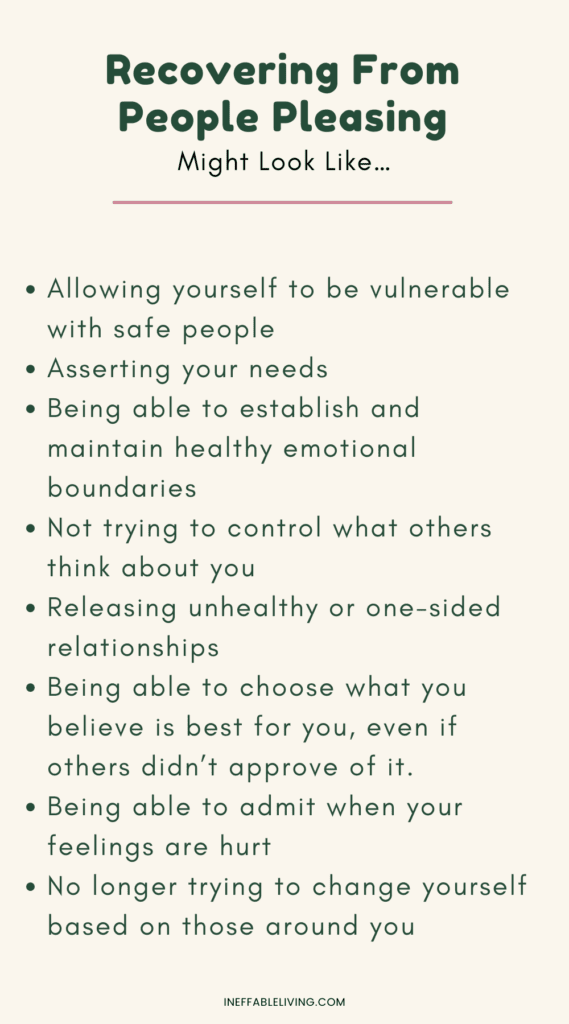
#19. Start Living in The Present
Mentally and emotionally, most people spend much of their time worrying or fantasizing about the future or regretting and blaming things that happened in the past.
Start living in the moment, by practicing paying attention to what’s around you and within you.
Throughout the day, check-in with yourself by answering the following questions:
- How am I feeling right now?
- Why am I feeling this way?
- Is there anything I can or need to do right now that will improve things?
#20. Practice Nonattachment
Most of us live in some form of attachment. We attach our worth and happiness to other people or to material things.
We believe that we can only be happy or feel worthy when people approve of us or when we achieve success. We may even come to believe that the things we’re attached to define who we are.
As a result, we may attempt to control people we believe are responsible for our happiness. This not only doesn’t work, but it also leaves us feeling resentful and pushes people away.
Nonattachment is letting go of trying to control things outside of our control and recognizing that our happiness and worth come from within.
Nonattachment is very different from passivity. When you’re not attached, you do your best in each situation, while letting go of the outcome, trusting that whether or not you receive approval, won’t change your own truth.
When you practice nonattachment, you don’t expect anyone or anything to control the way you feel. Instead, you take care of yourself and actively work on meeting your own needs, including being assertive in your relationships.
“Over time, we learn to trust that happiness and serenity are available to us. They are some of the natural results of no longer trying to control the world; instead, we let go and open to it. Many people describe this shift as connecting to a Higher Power.”
– Nancy Van Dyken
#21. Learn How to Forgive Others
“Forgiveness is letting go of the hope that the past can be changed.”
– Oprah Winfrey
Most of us recognize the importance of forgiveness, yet no one really taught us how to forgive.
When you have been people-pleasing for a long time, you may carry with you so much hurt and resentment that makes it especially difficult to forgive.
Forgiveness is not about letting someone off the hook. It is about freeing yourself of resentment and victimhood.
You forgive others and yourself as a part of your own healing.
Try This
- Take a few minutes to think of someone you are angry with.
- Feel our way into the emotions beneath the anger, such as hurt, confusion, disappointment, etc. Acknowledge these emotions and name them.
- Consider that when the person’s actions stemmed from their own pain and struggles.
- Also consider that people don’t control the way you feel and behave. That it’s about your own perception and interpretation of things that happen around you.
- Allow yourself to feel compassion toward this person. Think about their pain, limitation, and struggle.
- Accept the person for who they are and if you wish to reconcile, set clear boundaries with this person that keep you safe.
Related: How To Forgive And Free Yourself From Resentment And Bitterness?
Forgive Yourself When You Falter
Being assertive and setting boundaries can make you feel uncomfortable at first.
It will also take practice before it can become second nature to you.
So you’re bound to make mistakes and slip back into old patterns. This is perfectly fine. In fact, it’s part of the learning process.
Forgive yourself each time you falter and keep practicing.
Conclusion: Accepting That You Can’t Please Everyone Makes You Stronger Mentally
To enjoy an authentic life, your words and behavior must be in line with your beliefs and values.
When you stop striving to please everyone around you, you’ll experience several benefits including:
– Increased self-confidence. When you convince yourself that it’s not your responsibility to make others happy, you become more content with the decisions you make.
Even when other people don’t agree with your decisions, as long as they’re in line with your beliefs and values, you know that you’ve made the right decision. And your independence and confidence grow as a result.
– You’ll have more time and energy to direct toward your goals. Instead of wasting your time and energy doing things to please others or becoming what others want you to become, you’ll have that time and energy to devote to work on your own goals.
And you become more able to reach your potential.
– Reduced stress. When you set healthy boundaries for other people around you, you start experiencing less stress and irritation, and you feel more in control of your life.
-Healthier relationships. When you become more assertive and able to speak up for yourself, people will develop more respect for you.
They stop taking advantage of you, and you stop feeling resentful and angry.
Like everything associated with change, becoming more assertive, and standing up for yourself will take practice and time.
Always be aware of signs that you’re doing something to just please someone and work on leading a life that lines up with your beliefs and values.
References
Portions of this article were adapted from the book 13 Things Mentally Strong People Don’t Do, © 2013 by Amy Morin. All rights reserved.
Portions of this article were adapted from the book Everyday Narcissism: Yours, Mine, and Ours, © 2017 by Nancy Van Dyken. All rights reserved.
- 10 Signs You’re a People-Pleaser | Psychology Today
- How to Stop Being a People-Pleaser (But Still Be You) | Psych Central
- The Need to Please: The Psychology of People-Pleasing (psychcentral.com)
- What Is a People Pleaser? (webmd.com)
- People-Pleaser: Brain Scans Show Pushovers Agree With Others To Avoid Mental Stress (medicaldaily.com)
- Why People-Pleasing Is a Common Human Instinct | The Swaddle
- 11 Expert Tips to Stop Being a People Pleaser (w/ Science) (scienceofpeople.com)
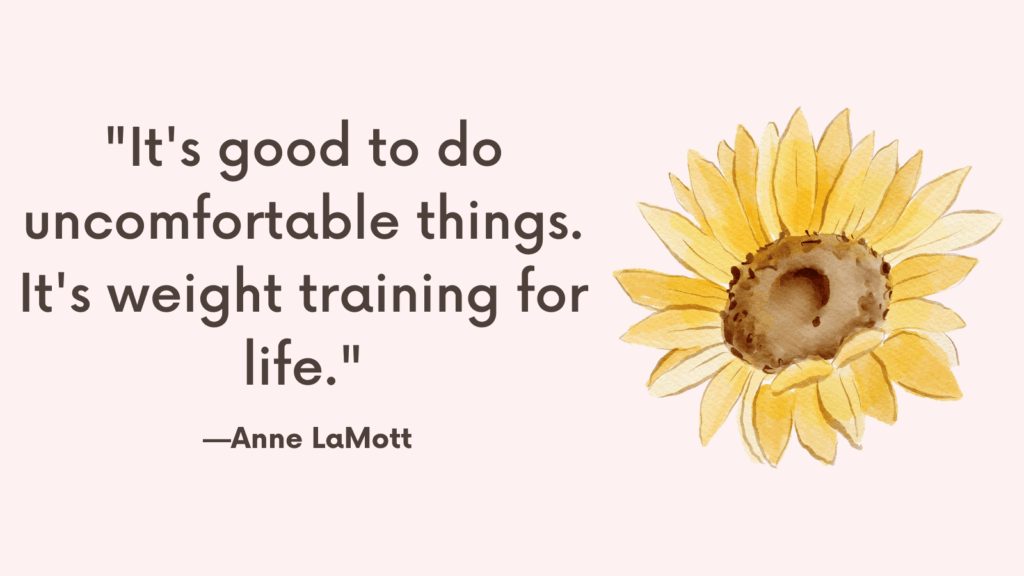




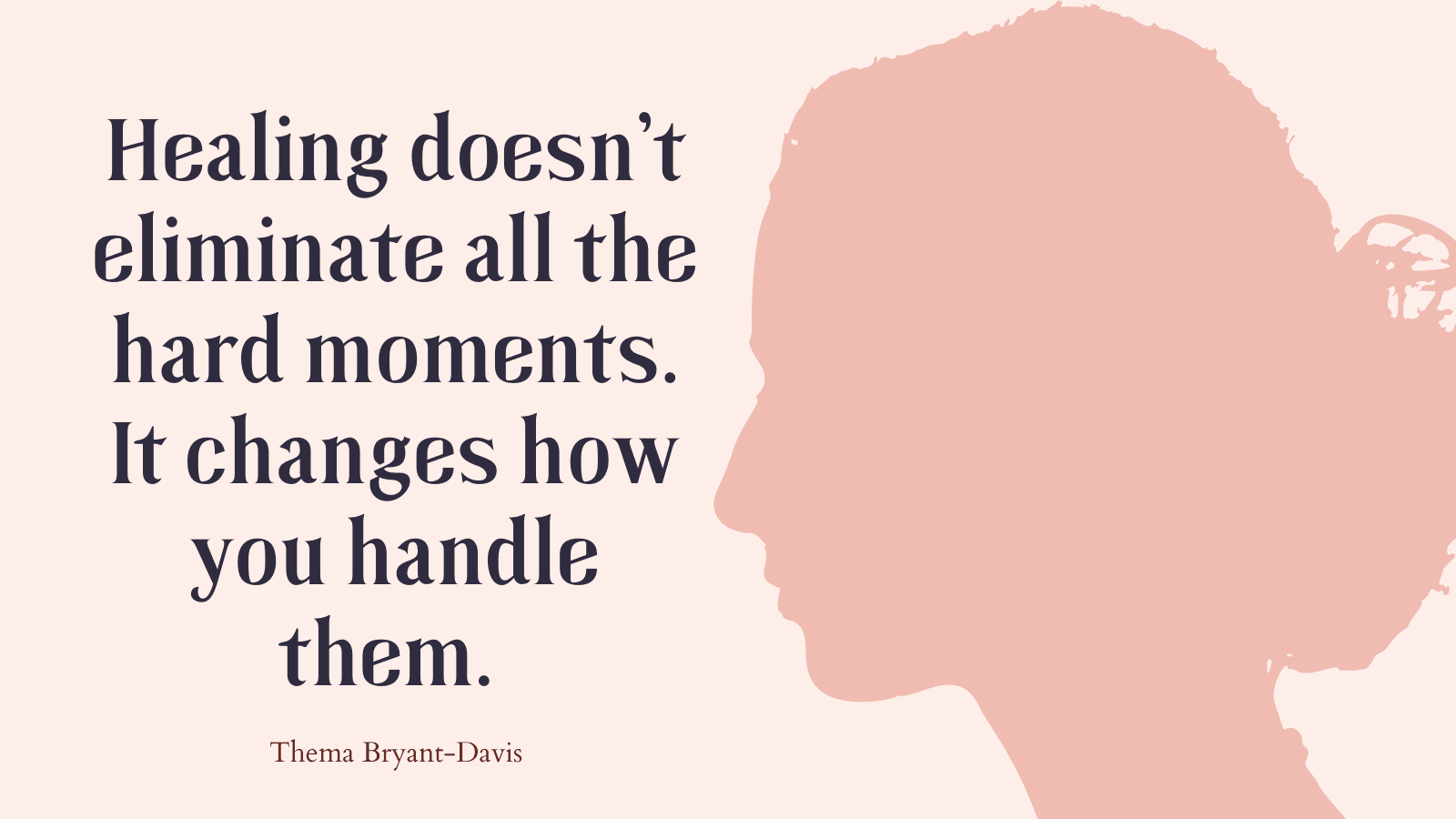

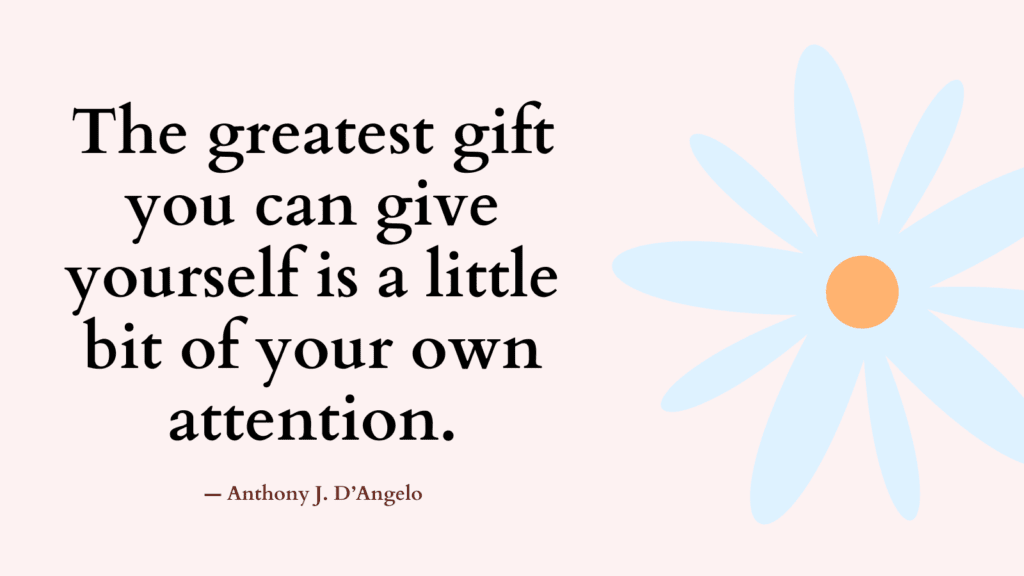
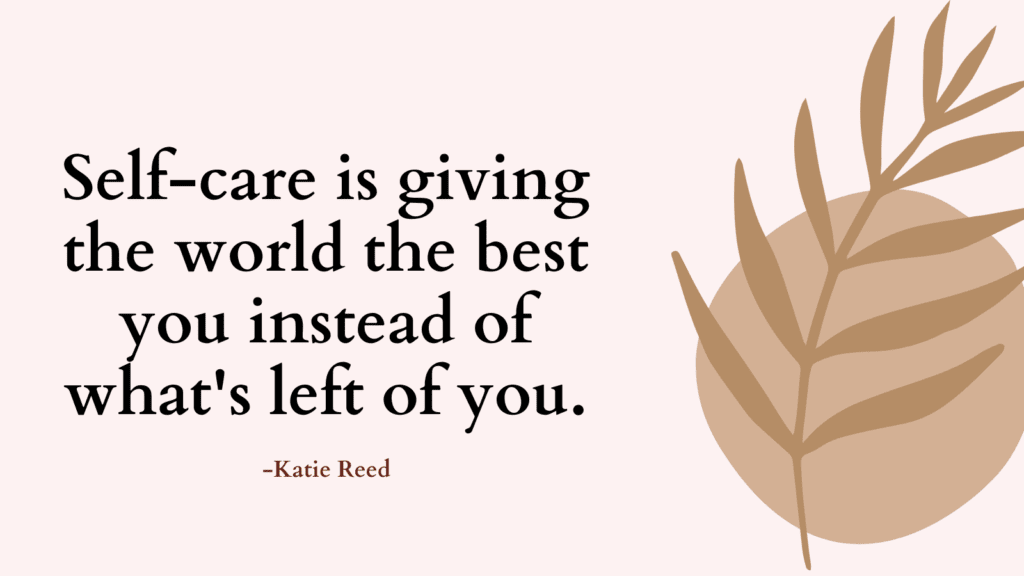
Comments are closed.